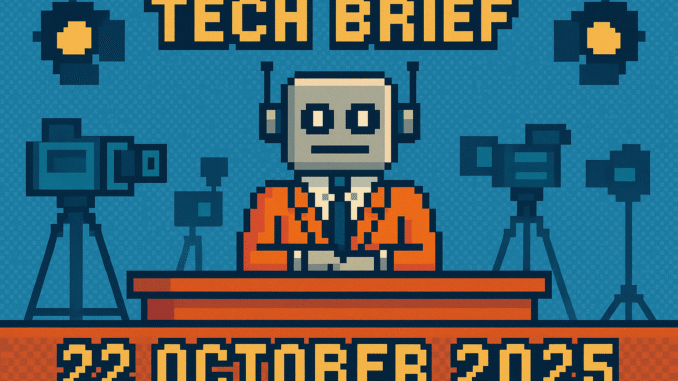
Tech Brief 22 October 2025 opens with a question that feels oddly personal: Would you trust a machine to deliver the news, or would you rather watch Max Headroom sweating under the lights? Today I’m picking apart a TV experiment that’s more uncanny than clever, the latest voice theft drama, and a cloud outage that left the UK staring at their own screens in confusion. Missed yesterday’s Tech Brief? Catch up here before diving in.
Channel 4’s AI Presenter Hosts Dispatches, Raises Spectre of Job Loss
“How long before telly feels less like telly and more like an algorithm reciting the news?” Last night, Channel 4’s Dispatches went all in on tech spectacle, putting an AI-generated presenter in the hot seat for an episode called “Will AI Take My Job?” The computer smooth host listed environmental costs, gave job loss warnings, and answered questions in a way that made Ceefax look animated.
Anyone who remembers the quirks and warmth of live presenters will feel the chill of this new, algorithmic approach. The AI warned eight million British jobs could be up for grabs, from the call centre to the newsroom. The subtext was almost too on the nose: an algorithm warning humans about algorithms. Editorially, it’s both a tech stunt and a pointed provocation about work’s future and probably not winning over Krishnan Guru-Murthy.
If the only personality on telly comes from whoever codes the presenter, how long before the audience switches off?
Bryan Cranston Welcomes Sora 2 Deepfake Crackdown
Numbers matter. In Sora 2’s first week, thousands of voice and face deepfakes swamped the platform, and Walter White himself pressed pause. Bryan Cranston lobbied unions and OpenAI when users discovered they could patch him into any video script without consent. “Unintentional,” said OpenAI, but it took an actor to demand repairs.
The union stepped in, forcing OpenAI to add stricter access and safeguards. For people used to imitating celebrities at karaoke, the new digital mashups are uncanny, pervasive, and uncomfortable.
No legal drama here, just the blend of tech naivety and old-school copyright panic. These days, you don’t need skill to mimic Cranston. Anyone with a prompt can drag familiar faces anywhere on the web. The public may be divided, but most would agree: generative tech is moving faster than common sense.
Who gets to pick which faces remain sacred online? Open question.
AWS Outage Disrupts Thousands, Reminds UK of Local Computing’s Charm
Genuine confession here: during yesterday’s AWS crash, I couldn’t help smiling as news filtered in about workers trapped, games offline, and coffee machines stuck in manual. The outage at Amazon’s massive North Virginia datacentre broke routines for over 2,000 companies, from Snapchat to Roblox and even language apps.
Kids moaned, businesses stalled, and in some offices, people remembered software that actually lived on your own machine. Thirty years ago, if a game crashed, you could patch it yourself or reload from floppy. For those of us who remember games spread across five floppy disks, the shift to cloud dependency is stark.
Should we rely this much on remote tech? If AWS resets the world with a power button, perhaps it’s time for a backup plan on a good old hard drive.
UK Police Rolls Out Live Facial Recognition Tech
What would Orwell make of this? A major UK police force begins using live facial recognition, actively scanning everyone who walks by and matching faces to criminal databases. Unlike the passive CCTV of the nineties, today’s algorithmic gaze is constant, immediate, and automatic.
Privacy advocates have raised concerns, but the technology rolls ahead. There’s barely a nod to the concept of asking permission. For those who recall grainy supermarket security footage, the step up is stark. British law enforcement once debated whether cameras were intrusive; now, the question is whether anyone can even opt out of tracking.
If you catch your reflection in the shop window, remember, you’re not just on camera anymore, you’re being indexed.
From the Wayback Machine
On This Day: 1941, Birth of Stanley Mazor, co-creator of the Intel 4004 microprocessor. Mazor’s work in that small Intel team made the first “computer on a chip” possible and set the stage for every programmable device to come. His technical ambition paved the way for both pocket calculators and the cloud that just crashed in the story above. Sometimes, progress gets ahead of us.
Today’s Big Question
With Channel 4’s AI host, Sora 2’s deepfakes, and AWS outages all in one Tech Brief 22 October 2025, where is the line between automation that’s helpful and automation that quietly erodes trust? For every technical leap, there is a new question about control. Maybe Mazor’s tiny processor has started something we can’t switch off.
Stay strange, keep something local, and next time the cloud collapses, dust off that floppy for me.
Missed yesterday’s Tech Brief? Catch up here

Leave a Reply